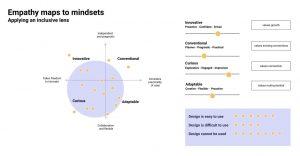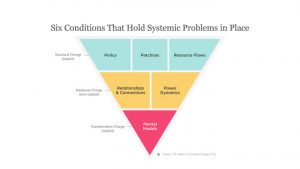Reflections on ableism and prompts to help you notice exclusion
Julianna Rowsell
We aim to break the cycle of exclusion with intentional inclusion.
Here are a few core ways to help to achieve this:
- Get comfortable with not knowing everything
- Identify pain points and how we might address them in our workflows or ways of working
- Reduce the problem space by focusing and activating goals forward
We have as many opportunities as we will allow ourselves to get better at being intentional about accessibility and inclusivity. We do not have to do it all today, or tomorrow and we can make mistakes and fail. Its what we do afterwards that is critical to culture change and outcomes.
Mindsets
Mindsets are a way to understand people’s attitudes, behaviours and motivations based on different variables. Mindsets change depending on the context.
Embrace curious mindset
Approach the unknown with curiosity rather than fear. The wildest Q can create the biggest opportunities. Embrace the phrase: “What if?”
Consider multiple perspectives
Consider people, teams, co-workers, stakeholders and the people who use our services. Inclusive Design demands that we use the diversity to challenge what is possible. Shift perspectives.
Prompt and experiment
The road to success and change is paved with small experiments. Recognize that struggle and embrace ambiguity.

Fairness & Inclusion
Treat people equitably.
- Have you treated people unfairly based on something they cannot change?
- How does ableism perpetuate bias or stigma?
Agency & Autonomy
Support and respect self-determination.
- What decisions have you made that divert power in a relationship?
- Do you value peoples time and energy?
- Can people participate or engage in the ways that they need to?
Openness & Transparency
Encourage openness and reflection.
- What do you need to know to understand how decisions are being made?
- How might you provide open channels of communication?
- When do you share information with people?
Respect & Dignity
Create interactions and expectations that are honest and consider human needs.
- Is your relationship with the person open, honest and transparent?
- How might you have reacted differently with other people?
- Do you value the persons time and energy?
Accountability & Governance
Take responsibility for how action and inaction effects human experiences and the implications that our decisions have on others.
- Are you willing to take ownership of your decisions?
- Do you see beyond the immediate repercussions when dealing with people?
- Are you willing to try to undo harm from your actions?
Growth
We can all learn and become better versions of ourselves.
- How are you encouraging questioning and unlearning?
- How are you encouraging self reflection?
- What things give you pause when you see overt and covert ableism in practice?
Removing or changing systems that uphold oppression

Aim to ask yourself and those around you powerful questions.
Provoke thinking
What’s important about that for you?
Shift perspective
How might this look from our user’s perspective?
Check assumptions
What assumptions are we making?
Challenge beliefs
How else could this situation be interpreted?
Identify and share back
Noticing and reflecting through the process allows designers to redesign themselves to be more equity-centered. Practicing self-awareness of one’s own identity, values, emotions, biases, assumptions and situatedness.
We are able to make more authentic connections between who we are and who they’re designing with. We can co-create and co-construct a new paradigm of design, one that is diverse, inclusive and equitable. Hold space for community to reflect, express and process thoughts and emotions. Balance quick action with thoughtful reflection.
Feedback
Disabled Futures and Ableism (short google form)

